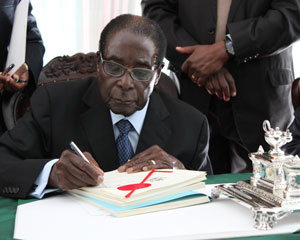
ZANU PF is no longer worried about legitimacy and will do whatever it takes to wrestle absolute political power in the forthcoming elections, analysts have said.
BY CAIPHAS CHIMHETE
They said securocrats and Zanu PF hardliners have pushed President Robert Mugabe to have early elections and use whatever means available to them to win the polls and deal with the consequences later while in power.
Under pressure, Mugabe unilaterally proclaimed dates for elections without consulting Prime Minister Morgan Tsvangirai, as stipulated by the Constitution and Global Political Agreement (GPA) signed in 2008. Tsvangirai’s protests have fallen on deaf ears but he has vowed to fight on.
Armed with a Constitutional Court order that he must hold elections by July 31 this year, Mugabe has insisted that his hands are tied by the ruling.
Sadc yesterday held a summit in Maputo, Mozambique to deal with Zimbabwe’s political crisis, but it is still to be seen if both parties will abide by the meeting’s resolutions.
There are widespread fears that securocrats and hardliners will push Zanu PF to resort to the “scorched earth policy” of 2008 — which left scores dead and thousands displaced — just to gain political power. Analysts said Zanu PF would not be worried of being labelled a “rogue regime” if Mugabe won disputed elections because there were other African countries led by governments not liked by Sadc and the African Union (AU).
Madagascar and the Central African Republic (CAR) have leaders considered “illegitimate” but are in power taking advantage of the continent’s weak conflict resolution mechanisms.
- Chamisa under fire over US$120K donation
- Mavhunga puts DeMbare into Chibuku quarterfinals
- Pension funds bet on Cabora Bassa oilfields
- Councils defy govt fire tender directive
Keep Reading
For the past four years, Madagascar was ruled by an “unelected and illegal civilian regime” that assumed power in a coup with military support.
Political analyst, Phillip Pasirayi said Zanu PF was not worried about legitimacy but what was more important for the party was to regain its hegemony. It will worry about other things later when they have the power in their hands, he noted.
“Zanu PF is aware of illegitimate governments in Madagascar and CAR which have continued to rule even when they are under sanctions and isolation by some sections of the international community,” said Pasirayi.
He believes there would be mixed responses from the international community if Zanu PF were to bulldoze its way into office.
Pasirayi noted that the softening in the European Union (EU)’s approach to Harare, which was probably motivated more by economic and strategic interests rather than the love for democracy.
“So it is not surprising to see the West embracing a Zanu PF victory even in controversial circumstances,” said Pasirayi.
But Phillan Zamchiya, a lecturer at Oxford University believes that Zanu PF would not use political violence but subtle electoral manipulation so that it gets some form of legitimacy.
“Subtle techniques of election manipulation will be used that are less costly and less visible,” he said.
“But of course, violence is endemic and institutionalised. It would be spontaneous in some areas but not to the levels of June 27, 2008. They will just rattle the match-box intimidating people in what I call harvest of fear in my works.”
Zamchiya said the Madagascar and CAR cases were far-fetched examples. “In those contexts we are talking of overt military coups, in Zimbabwe if it happens it will be covert with a civilian leader as the face of it,” he said.
Zamchiya said Zanu PF believes the key to gaining political legitimacy is not about election dates or padding the margins of votes, but reducing the amount of naked State-sponsored violence.
Once that is done, Zanu PF believes the election will be declared acceptable and credible, he said.
“They have made a calculation on what can be the minimum threshold acceptable to the region and international community,” said Zamchiya. If Zanu PF did not worry about legitimacy at all they could not have clothed their chicanery through the court process, they could have gone for open style rule by decree consistent with closed authoritarian states.”
Pasirayi agrees that Zanu PF will not commit “overt violence”, but will target known MDC activists for harassment.
“It is highly unlikely the party will repeat its “scorched earth policy” of 2008,” he said.
‘SECUROCRATS NOT CERTAIN ABOUT FUTURE’
Political analyst, Dumisani Nkomo said Mugabe and securocrats were more worried about political survival than legitimacy as the country gears for elections.
He said his party would rather butcher its political rivals into submission than losing power. The MDC-T claimed that at least 200 of its supporters were killed by Zanu PF youth militia and State security agents during the 2008 elections.
“They [Zanu PF] know that Sadc did nothing in Madagascar and it will do nothing to them. In any case it does not have a force,” said Nkomo. “They can only apply diplomatic pressure, which Zanu PF is prepared to deal with after elections, if they are disputed.”
He added that the United Nations (UN) cannot intervene as it did in Libya because there is no outright violence and deaths in the country that warrants international intervention.









